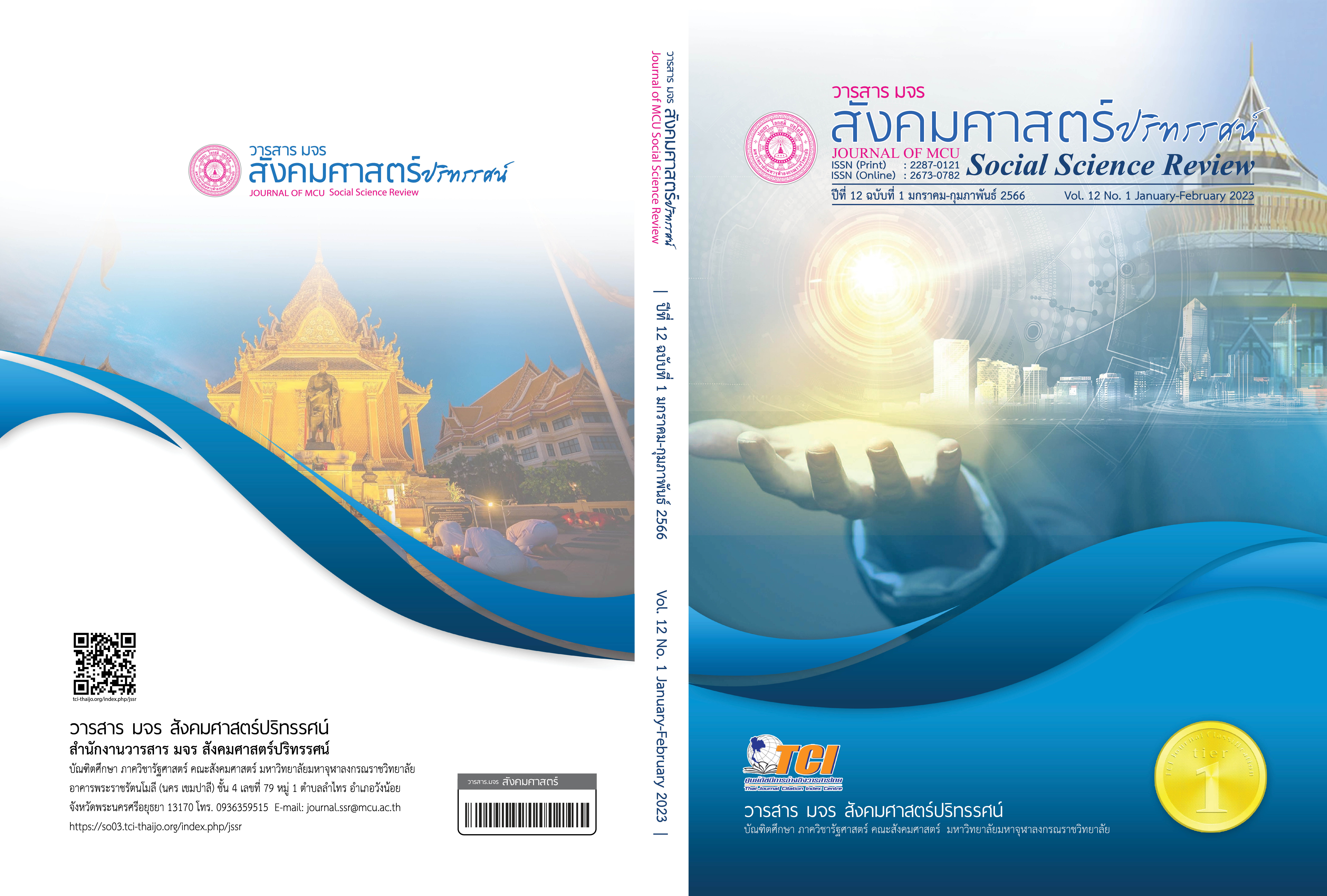กลยุทธ์การนำศาสตร์พระราชาในการจัดการศึกษาตามหลักปรัชญาของเศรษฐกิจพอเพียงในโรงเรียนมัธยมศึกษาขนาดกลาง ภาคตะวันออกเฉียงเหนือ
คำสำคัญ:
ศาสตร์พระราชา, การจัดการศึกษา, เศรษฐกิจพอเพียงบทคัดย่อ
บทความวิจัยนี้มีวัตถุประสงค์เพื่อนำเสนอกลยุทธ์การนำศาสตร์พระราชาในการจัดการศึกษาตามหลักปรัชญาของเศรษฐกิจพอเพียงในโรงเรียนมัธยมศึกษาขนาดกลาง ภาคตะวันออกเฉียงเหนือ เป็นการวิจัยแบบผสมผสาน มี 4 ระยะ ดังนี้ 1) ศึกษาสภาพปัจจุบันและความต้องการ ตัวอย่างได้แก่ ผู้อำนวยการโรงเรียน 164 คน ได้มาโดยการสุ่มอย่างง่าย และศึกษาดูงานโรงเรียนที่มีผลการปฏิบัติที่เป็นเลิศ 3 แห่ง 2) สร้างกลยุทธ์ กลุ่มเป้าหมาย ได้แก่ ผู้เชี่ยวชาญ 11 คน ได้มาโดยเลือกแบบเจาะจง 3) ทดลองใช้กลยุทธ์ กลุ่มเป้าหมายคือ ผู้บริหารโรงเรียน ครูผู้สอน และคณะกรรมการสถานศึกษา 51 คน ได้มาโดยเลือกแบบเจาะจง และ 4) การประเมินผลกลยุทธ์ กลุ่มเป้าหมาย ได้แก่ ผู้ทรงคุณวุฒิและผู้มีส่วนได้ส่วนเสีย 21 คน ได้มาโดยเลือกแบบเจาะจง เครื่องมือที่ใช้ได้แก่ แบบสอบถาม แบบสัมภาษณ์ แบบบันทึกการสนทนากลุ่ม และแบบประเมินกลยุทธ์ สถิติที่ใช้ได้แก่ ร้อยละ ค่าเฉลี่ย ส่วนเบี่ยงเบนมาตรฐาน และการวิเคราะห์เนื้อหา
ผลการวิจัยพบว่า 1) สภาพการนำศาสตร์พระราชามาใช้ในการจัดการศึกษา โดยรวมอยู่ในระดับมาก 2) กลยุทธ์การนำศาสตร์พระราชาในการจัดการศึกษาตามหลักปรัชญาของเศรษฐกิจพอเพียง ประกอบด้วย วิสัยทัศน์ พันธกิจ เป้าประสงค์ กลยุทธ์ และตัวชี้วัดความสำเร็จ โดยใช้หลักการเข้าใจเป้าหมาย เข้าถึงแนวทางพัฒนา และพัฒนาอย่างยั่งยืน ขับเคลื่อน 4 กลยุทธ์หลัก ได้แก่ การบริหารจัดการโรงเรียนสู่คุณภาพ การพัฒนาบุคลากรสู่มืออาชีพ การพัฒนาหลักสูตรและการจัดการเรียนรู้สู่ความยั่งยืน และการส่งเสริมกิจกรรมพัฒนาผู้เรียนสู่ความพอเพียง 3) หลังทดลองใช้กลยุทธ์ พบว่า มีความพึงพอใจโดยรวมอยู่ในระดับมากที่สุด 4) ผลการประเมินกลยุทธ์ มีความเหมาะสม ความเป็นไปได้ และความเป็นประโยชน์ โดยรวมอยู่ในระดับมากที่สุด
เอกสารอ้างอิง
จักรพงศ์ มัตสยะวนิชกูล. (2561). กลยุทธ์การบริหารสถานศึกษาตามหลักปรัชญาของเศรษฐกิจพอเพียงเพื่อการพัฒนาอย่างยั่งยืน (วิทยานิพนธ์ปริญญาครุศาสตรดุษฎีบัณฑิต สาขาวิชาการบริหารการศึกษา). นครปฐม: มหาวิทยาลัยราชภัฏนครปฐม.
ชวลิต จันทร์ศรี. (2555). การพัฒนารูปแบบการบริหารจัดการเพื่อจัดการเรียนรู้ตามหลักปรัชญาของเศรษฐกิจพอเพียงในโรงเรียน สังกัดสำนักงานเขตพื้นที่การศึกษามหาสารคาม เขต 3 (ครุศาสตรดษฎีบัณฑิต สาขาวิชาการบริหารการจัดการศึกษา). มหาสารคาม: มหาวิทยาลัยราชภัฏมหาสารคาม.
ธนกฤต สิทธิราช และคณะ. (2558). อนาคตภาพการจัดการมัธยมศึกษาของประเทศไทยในสองทศวรรษหน้า. ศึกษาศาสตร์ มหาวิทยาลัยนเรศวร, 7(3), 71-80.
เนาวรัตน์ นาคพงษ์. (2555). กลยุทธ์การบริหารสถานศึกษาขั้นพื้นฐานจังหวัดกำแพงเพชรโดยใช้หลักปรัชญาของเศรษฐกิจพอเพียง (วิทยานิพนธ์ปรัชญาดุษฎีบัณฑิต สาขาวิชายุทธศาสตร์การบริหารและการพัฒนา). กำแพงเพชร: มหาวิทยาลัยราชภัฏกำแพงเพชร.
บุญเลิศ เย็นคงคา และคณะ. (2549). การจัดการศึกษาเชิงกลยุทธ์. กรุงเทพฯ: วี.เจ.พริ้นติ้ง.
บุษกร วัฒนบุตร และคณะ. (2561). ศาสตร์พระราชากับการพัฒนาคนไทย. วารสาร มจร สันติศึกษาปริทรรศน์, 6 (พิเศษ), 539-552.
พชรวิทย์ จันทร์ศิริสิร. (2560). การพัฒนาสมรรถนะหลักและประสิทธิภาพในการทำงานของข้าราชการครูในภาคตะวันออกเฉียงเหนือ. วารสารสุทธิปริทัศน์, 31(100), 144-158.
พารดา หาบ้านแท่น. (2563). กลยุทธ์การบริหารโรงเรียนตามหลักปรัชญาของเศรษฐกิจพอเพียงที่มีประสิทธิผลสำหรับโรงเรียนประถมศึกษา สังกัดสำนักงานศึกษาธิการ ภาค 11 (วิทยานิพนธ์ครุศาสตรดุษฎีบัณฑิต สาขาวิชาการบริหารและพัฒนาการศึกษา). สกลนคร: มหาวิทยาลัยราชภัฏสกลนคร.
สมชาย ภคภาสน์วิวัฒน์. (2553). การบริหารเชิงกลยุทธ์. กรุงเทพฯ: แมคกรอ-ฮิล.
สำนักกรรมาธิการ 1 สำนักเลขาธิการสภาผู้แทนราษฎร. (2560). รายงานของคณะกรรมการขับเคลื่อนสืบสานศาสตร์พระราชา สภาขับเคลื่อนปฏิรูปประเทศ เรื่อง “การขับเคลื่อนสืบสานศาสตร์พระราชาเพื่อการปฏิรูปประเทศ”. กรุงเทพฯ: รัฐสภา.
สำนักงานเลขาธิการสภาการศึกษา. (2560). แผนการศึกษาแห่งชาติ พ.ศ. 2560-2579. กรุงเทพฯ: พริกหวานกราฟฟิค จำกัด.
สุธรรม ธรรมทัศนานนท์. (2560). การพัฒนารูปแบบการบริหารจัดการศึกษาตามหลักปรัชญาของเศรษฐกิจพอเพียง ของสถานศึกษาสำหรับสถานศึกษาสังกัดสำนักงานเขตพื้นที่การศึกษามัธยมศึกษา เขต 27. วารสารศึกษาศาสตร์, 28(1), 140-141.
สุนันท์ ศลโกสุม และไพฑูรย์ โพธิสาร. (2561). ศาสตร์พระราชากับการพัฒนาการศึกษา. วารสารออนไลน์, 12 (เสริม), 9-21.
เอกลักษณ์ พลศักดิ์ และคณะ. (2564). กลยุทธ์การบริหารโรงเรียนคุณภาพประจำตำบล สังกัดสำนักงานคณะกรรมการการศึกษาขั้นพื้นฐาน. วารสาร มจร สันติศึกษาปริทรรศน์, 9(4), 1430-1443.
Hong, et al. (2009). A Bottom-up Definition of Self-sufficiency: Voices from Low-income Jobseekers. Qualitative Social Work, 8(1), 376–357.
Lamberton, G. (2005). Sustainable sufficiency: An internally consistent version of sustainability. Sustainable Development, 13(1), 53-68.
ดาวน์โหลด
เผยแพร่แล้ว
รูปแบบการอ้างอิง
ฉบับ
ประเภทบทความ
สัญญาอนุญาต
ลิขสิทธิ์ (c) 2023 วารสาร มจร สังคมศาสตร์ปริทรรศน์

อนุญาตภายใต้เงื่อนไข Creative Commons Attribution-NonCommercial-NoDerivatives 4.0 International License.
เพื่อให้เป็นไปตามกฎหมายลิขสิทธิ์ ผู้นิพนธ์ทุกท่านต้องลงลายมือชื่อในแบบฟอร์มใบมอบลิขสิทธิ์บทความให้แก่วารสารฯ พร้อมกับบทความต้นฉบับที่ได้แก้ไขครั้งสุดท้าย นอกจากนี้ ผู้นิพนธ์ทุกท่านต้องยืนยันว่าบทความต้นฉบับที่ส่งมาตีพิมพ์นั้น ได้ส่งมาตีพิมพ์เฉพาะในวารสาร มจร สังคมศาสตร์ปริทรรศน์ เพียงแห่งเดียวเท่านั้น หากมีการใช้ภาพหรือตารางหรือเนื้อหาอื่นๆ ของผู้นิพนธ์อื่นที่ปรากฏในสิ่งตีพิมพ์อื่นมาแล้ว ผู้นิพนธ์ต้องขออนุญาตเจ้าของลิขสิทธิ์ก่อน พร้อมทั้งแสดงหนังสือที่ได้รับการยินยอมต่อบรรณาธิการ ก่อนที่บทความจะได้รับการตีพิมพ์ หากไม่เป็นไปตามข้อกำหนดเบื้องต้น ทางวารสารจะถอดบทความของท่านออกโดยไม่มีข้อยกเว้นใดๆ ทั้งสิ้น





